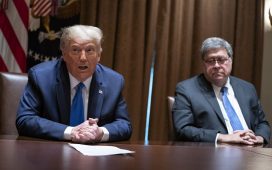With help from Tanya Snyder and Brianna Gurciullo
Editor’s Note: Morning Transportation is a free version of POLITICO Pro Transportation’s morning newsletter, which is delivered to our subscribers each morning at 6 a.m. The POLITICO Pro platform combines the news you need with tools you can use to take action on the day’s biggest stories. Act on the news with POLITICO Pro.
— The House’s ambitious surface transportation bill released this week is already running into some problems, with some industry groups and Republicans crying foul over what they called a “partisan” process.
— Transportation Secretary Elaine Chao stuck by the agency’s hands-off approach to regulating air travel during the pandemic in an interview with POLITICO.
— As part of an escalating row with China over airline access, DOT said it will ban Chinese flights from the U.S. later this month.
IT’S THURSDAY: Thanks for tuning in to POLITICO’s Morning Transportation, your daily tipsheet on all things trains, planes, automobiles and ports. Get in touch with tips, feedback or song lyric suggestions at [email protected] or @samjmintz.
LISTEN HERE: Follow MT’s playlist on Spotify. What better way to start your day than with songs (picked by us and readers) about roads, railways, rivers and runways.
LET THE SURFACE CIRCUS BEGIN: House Democrats’ climate-focused surface transportation reauthorization got skewered on Wednesday by Republicans and some industry groups, including those representing the rail industry and state transportation departments. GOP lawmakers accused House Transportation Chair Peter DeFazio of shutting out Republicans and unveiling a partisan bill that has an “extreme” environmental agenda. Some turned to the Senate’s version of the bill, which included a climate title for the first time but holds more modest goals than DeFazio’s proposal to discourage states from building new highways and include climate impacts in transportation plans.
Two weeks to work it out: DeFazio told reporters that Republicans left “very little room” for engagement on climate issues and Democrats crafted the bill according to their own priorities — and that they’d likely have no problem passing it in the House even without Republican votes. But before the July 1 floor vote comes the June 17 markup, and DeFazio said he scheduled a two-week window between the release of the bill text and the markup to make time for amendments and other input from Republicans. Tanya Snyder has all the details for Pros.
Guinea pig: The transportation bill markup will be a trial run for new House rules that allow the legislative process to go forward remotely, as our Connor O’Brien observed. He notes that the surface vote will happen before the defense authorization bill, and that T&I is a bigger committee than Armed Services.
NOT OUR JOB: Chao hit back at criticism over how her agency has handled regulating pandemic measures for airlines, calling questions about masks and social distancing “labor management” issues. “When the federal government gets involved, we tend to be much more heavy handed,” Chao said on Wednesday, while noting that her agency continues to “monitor” the situation.
Her comments, made during a virtual interview with POLITICO Playbook, earned a strong reaction from labor unions and workplace safety advocates. David Michaels, who was head of OSHA during the Obama administration, called it an “abdication of duty.” Labor unions for flight attendants and pilots, which have called for DOT to make health guidelines mandatory, were mad, too. “There’s a difference between heavy handed and just washing your hands of this critical responsibility,” said Dennis Tajer, a spokesperson for the Allied Pilots Association, calling DOT an “outlier” on safety.
An example of the patchwork: Delta Air Lines on Wednesday said it would keep preventing customers from picking middle seats and extend caps on seating through the end of September. “On routes where increasing customer demand is driving flight loads closer to our caps, we will look for opportunities to upsize to a larger aircraft type or add more flying,” the carrier said.
DOT FINALIZES SERVICE EXEMPTIONS: DOT issued a notice late Wednesday easing airlines’ service requirements that are a condition of receiving CARES Act aid. The final order, which is unchanged from a previously published preliminary order, says carriers can suspend service to either 5 percent of the points they cover, or five points, whichever is greater. “The Department believes that the process we are finalizing here strikes an appropriate balance between the needs of communities to maintain at least minimal access to the national air transportation system during the public health emergency, and the needs of carriers to conserve financial resources to weather this time of unprecedented loss of demand,” the agency wrote.
EYE FOR AN EYE: DOT announced on Wednesday that it plans to stop Chinese passenger carriers from flying into or out of the U.S. this month because China hadn’t taken steps to give Delta and United Airlines the OK to resume service to the country.
Move gets results: Shortly after, China said in a statement that it will ease its restrictions on foreign airlines flying into the country, according to Reuters. “Qualifying foreign carriers currently barred from operating flights to mainland China will be allowed once-per-week flights into a city of their choosing starting on June 8,” the story says. The number of flights can increase if no passengers on the incoming flights test positive for three weeks.
The DOT restriction, which would hit four Chinese airlines, is set to go into effect June 16. As our Brianna Gurciullo reports, DOT said its move would “restore a competitive balance and fair and equal opportunity among U.S. and Chinese air carriers in the scheduled passenger service marketplace.” The agency says its “overriding goal” is for airlines from both countries to “be able to exercise fully their bilateral rights.”
Calling all China watchers: The trajectory of the U.S.-China relationship will determine whether this century is judged a bright or a dismal one. POLITICO’s David Wertime is launching a new China newsletter that will be worth the read.
THE LOW LOWS: Airline fuel consumption hit its lowest point in at least 20 years in April, according to the new numbers from DOT’s Bureau of Transportation Statistics. There were 447 million gallons of fuel consumed that month, down from 1.5 billion the year before, a 70 percent drop.
FOR THE RECORD: After the New York Times reported this week that TSA officers had been “called out of the airports to help protect federal property” amid protests in the D.C. area over the death of George Floyd while in police custody, the agency made clear that those employees weren’t security screeners but rather law enforcement officers. “@TSA officers who interact with and screen passengers and their baggage at airports every day did not participate in responding to #BlackLivesMatter protests. Airport TSA officers are not law enforcement officials,” agency spokesperson Lisa Farbstein said in a tweet.
GOVERNING FROM HOME: In the interview with POLITICO, Chao also noted that while she expects the transportation world to return to normal relatively soon, there could be long-term changes to employers like hers that could stick around. “We’re going to see trends develop in telework,” Chao said. “Do we really need a building for 5,500 people [the size of DOT’s headquarters] when more and more people are feeling more comfortable teleworking … and video conferencing?”
— “Pakistani aviation authority says PIA pilot ignored air traffic control.” Reuters.
— “Full rollout for contactless payments in NYC subways delayed until December.” The Verge.
— “Former UAW president pleads guilty to embezzlement, racketeering charges.” Wall Street Journal.
— “VRE seating is now every other window seat.” WTOP.
— “Air Canada retires last Boeing 767 after 37 years.” The Points Guy.
DOT appropriations run out in 118 days. The FAA reauthorization expires in 1,214 days. Highway and transit policy is up for renewal in 118 days.








